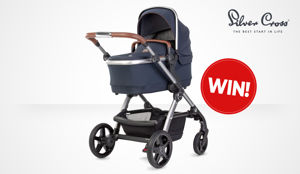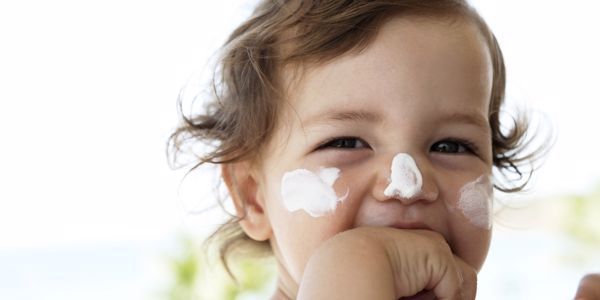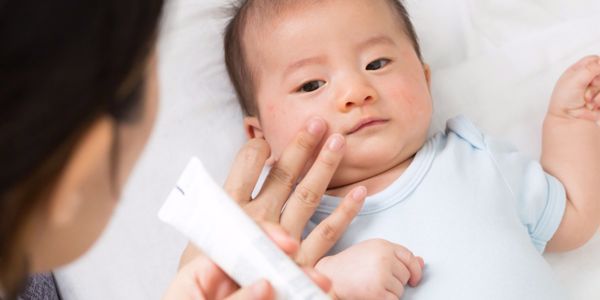As a new parent, it’s difficult not to worry when your little one develops a rash. While dry skin is common in babies, eczema can also appear in the early months.
Here, we will dive into baby eczema and help you understand the difference between the two, so you can take the best course of action for your baby's comfort.
What is Baby Eczema?
Baby eczema, also known as atopic dermatitis, is a common skin condition that affects many little ones. It causes their skin to become dry, itchy, and inflamed. While the exact cause is unknown, it's thought to be linked to a combination of genetics and environmental factors.
Eczema isn't contagious, but it can flare up due to certain triggers. These triggers can vary from baby to baby, but common ones include dry weather, irritants in clothing (like wool), dust mites, and food allergies (like milk or eggs).Understanding the triggers can help you manage your baby's eczema and keep flare-ups at bay.
Identifying Triggers of Baby Eczema
When your little one is dealing with eczema, it can be quite upsetting to see them uncomfortable and itchy. Understanding what triggers this condition in the daily environments you and your baby occupy can be a game-changer in managing their symptoms. Common culprits that can set off your baby's eczema include allergens like dust mites, pet dander, and pollennasty little things that can turn your bundle of joy's skin into an itchy, inflamed battleground.
Dust mites, though invisible to the naked eye, can wreak havoc. They thrive in warm, humid environments, making a cosy home in your baby's bedding, carpets, and furniture. Their droppings are particularly irritating for sensitive skin, leading to itching and redness. To combat these unwelcome guests, the NHS suggests using allergen-proof covers for mattresses and pillows, washing bedding in hot water weekly, and keeping the humidity down with a dehumidifier to make your home less inviting to dust mites.
Pet dander is another trigger that can be tough to handle, especially when pets are part of the family. While it's a tough pill to swallow, keeping furry friends out of your baby's nursery and ensuring you wash your hands after petting them can reduce the amount of dander around your baby. Investing in a HEPA air purifier can also help clear the air of these allergens.
Pollen, too, can lead to flare-ups, particularly during those peak seasons when the air is thick with it. Keeping windows shut, using air conditioning to filter the air, and giving clothes and bedding a regular wash can help keep pollen at bay. And yes, a HEPA air purifier is once again a handy ally in the fight against these seasonal invaders.
It's not just the allergens floating around in the air; even the products you use on your baby's skin can trigger eczema. Harsh soaps, shampoos, and lotions that contain chemicals or fragrances might smell nice, but they can be harsh on your baby's delicate skin. Opting for gentle, fragrance-free products can help you sidestep this issue and keep your little one's skin calm and clear. Remember, identifying and steering clear of these triggers is your first line of defence in keeping your baby's eczema under control.
For more advice on the symptom of baby eczema and how to differentiate it from dry skin, we’ve caught up with Dr José Costa, a Senior Paediatric Consultant. Here’s what he had to say:
Dry Skin vs Eczema
Although the symptoms can overlap, there are key differences between eczema and dry skin.
The main thing to note is that dry skin is far more common than eczema, which affects roughly 11% to 20% of children and 5% to 10% of adults in the UK.
Eczema is a genetic and inflammatory condition affecting the skin, whilst dry skin can occur at any age, but particularly in babies and older people, and several factors can lead to it.
Things like water limescale, harsh soaps or detergents, frequent washing, cold weather, indoor heating, air conditioning, some fabrics (acrylic, polyester and nylon, among others) and even saliva (on areas around the mouth, neck and hands), can dry baby’s skin.
If these triggers are avoided and your baby's skin is well moisturised, dry skin symptoms will quickly disappear. However, if they persist or become worse, despite taking these measures, then we are likely to be dealing with eczema, which will require further treatment and attention.
Baby Eczema Symptoms
Dry skin is not specific to certain areas of the body and it tends to appear following a skin contact reaction to the above-mentioned factors. Eczema is classically found on the flexures of the arms and legs, although it can appear in any part of the body.
With eczema, dry, flaky skin tends to be itchy and can become inflamed, leading to weeping. Itching, can cause scratch marks, which can bleed and occasionally become infected if not treated.
For children born in an atopic family (with a history of eczema, asthma, or hay fever), the risk of developing eczema is higher.
If your baby’s skin is dry, whether from eczema or simply dry skin, it’s important to moisturise the skin frequently and choose options that do not contain alcohol, perfume, or allergens. Occasionally, steroids might be prescribed for eczema, but this should be in short courses of a maximum of one week, unless advised otherwise by an allergist or dermatologist.
Giving antihistamines, mainly Chlorphenamine, might also be helpful in relieving the itching caused by eczema.
Navigating the challenges of baby eczema can be difficult for both you and your little one. As you learn to identify triggers, things can get easier. From allergen management to choosing the right skincare products, each step is crucial in providing relief and comfort.
It's important to remember that while this guide offers helpful insights, individual cases vary, and seeking advice from your GP or a healthcare provider like Dr Costa is the best way to address specific concerns and develop a tailored care plan.






